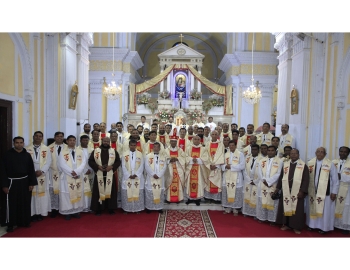
.jpg) P. A. Joseph
P. A. Joseph
.jpg)
The Capuchin friars celebrated the centenary of the establishment of their first Novitiate in India at Mussorie-Sardhana. Major Superiors, novice masters, and representatives from 13 canonical jurisdictions of the Capuchins serving in different parts of the country gathered at Sardhana in Uttar Pradesh on 24th February and at Mussorie in Uttarakhand on 25th February to mark the occasion. Keeping in mind the historicity of the Capuchin Novitiate at Mussorie and Sardhana, the celebration at Sardhana was centred around the Holy Eucharist presided over by Most Rev. Ignatius Mascranus, bishop of Simla- Chandigarh diocese. It was held in the Basilica of Our Lady of Graces, Sardhana.
In Mussorie, the celebration was held at the auditorium of St. George’s College. Fr. John Baptist, the General Councillor, gave a short history of the Capuchins working in different parts of the world. Fr. Stanislaus Alla S.J. gave the keynote address on formation of religious.
Arrival of Capuchins
The arrival of the Capuchins in India dates back to 1632 when a band of foreign Capuchin Missionaries landed in Pondicherry. Their intention was to extend their missionary thrust to Tibet and Nepal; however, it turned out that they continued their work in the Vicariate of Agra and Patna. After slogging as missionaries for about two-and-a-half centuries, the idea of implanting the Order in India was considered as a possibility.
Hence in 1880 a Novitiate house was opened in Mussoorie. Just ten years later, however, this Novitiate was closed for want of vocations. A second attempt at beginning the Order in India was made on 26 February 1922, at the instance of the then General Minister of the Order, Br. Joseph Anthony of Persiceto. He inaugurated the Novitiate personally at Sardhana, which could be said as the cradle of the Capuchin Order in India for many years to come. Two Indian novices were vested on this occasion in the Novitiate named after St. Fidelis of Sigmaringen, the Protomartyr of the Capuchin Order. The Superiors Regular of Agra, Ajmer, Allahabad and Lahore were jointly responsible for the success of this venture.
Vocations to the Order came from many dioceses of India but more from the South than the North. To overcome many of the teething troubles in the area of formation, the novitiate was later placed under the care of the Superior Regular of Ajmer and to continue the post-novitiate formation, a study house was started at St. Francis Monastery, Mussoorie. The early Capuchins were then sent to Europe to pursue further studies with the French friars at Breust, Tours and Nantes.
Rapid growth
The absence of a strong, vibrant and populous Christian community in North India, even as the extreme weather conditions of the place, called for a transfer of the Novitiate from North to a more favourable location in South India. The Province of Paris was called upon to undertake this venture. The Capuchins were offered a little hill at Farangipet, called Monte Mariano, in the diocese of Mangalore and hence the decision to shift the Novitiate was carried out in May 1930. Monte Mariano, therefore, can well be called the second cradle of the Capuchins in India. From then on, the growth of the Capuchins was rapid and in 1932 a study house was set up in Quilon and most of the students who had not yet finished their studies abroad were brought back to continue their studies there.
Naming of Br. Guido Le Floch as the General Commissary in 1933 marked the next phase of the growth of the Order in India. The influx of candidates was unabated and the Order grew from strength to strength. Br. Richard Brunner from Calvary Province of USA, who was put in charge of the Indian Capuchin Mission, was made Commissary Provincial in 1951; in 1954 Br. Cyril Andrade became the first Indian to head the unit as Commissary Provincial. In 1956 the Agra Archdiocese was entrusted to the Order and Br. Dominic Athaide was consecrated as the first Indian Capuchin Bishop of Agra. The number of Capuchins by now had grown from 41 in 1933 to almost 200 in 1960.
Autonomous Province
Br. Clement of Milwaukee, the General Minister, who had known the growth of the Capuchin jurisdiction in India during his first visit, paid a second visit in 1962 during his second term for constituting the Indian unit into a full-pledged Capuchin Province. Br. John Berchmans Puthuparambil was appointed as the first Provincial Minister. Ever since the Novitiate was shifted to Monte Mariano, the province had seen steady and rapid growth, so much so that by 1967, just 40 years after migrating to the South, it could count about 500 friars distributed among 40 houses in the 5 states of Karnataka, Goa, Maharashtra, Kerala and Tamil Nadu. Besides, they were also working in many states of Northern India as missionaries and even in some foreign countries like Indonesia, the Philippines and Tanzania as formators. Some had reached as far as Malaysia for implanting the Order.
In these circumstances, there was an urgent need of creating smaller jurisdictions for the sake of greater efficiency and a better implantation of the Order in various regions in India. The first discussion to this effect took place during the Provincial Chapter of 1969. Br. Jacob Acharuparambil was elected as the Provincial Minister. He was also the last of Provincial Ministers of the united Indian Province as the jurisdiction had grown too big and as such stood in great need of a division, if only for the sake of good administration.